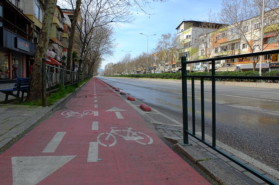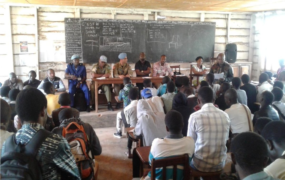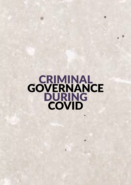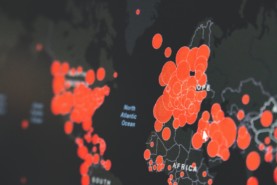Posted on 03 Jun 2020
Governments around the world are deploying military forces to support the fight against the pandemic. But there are crucial lessons to be learnt from other military interventions during peacetime emergencies, not least from how militarized responses have been used worldwide to combat organized crime and illicit markets.
The involvement of the military in relief operations outside the arena of conflict is not a unique phenomenon in recent times. Military units were engaged in responding to the 1991 cyclone in Bangladesh, Hurricane Mitch in Central America in 1998, Hurricane Katrina in 2005 and the 2008 Sichuan earthquake in China. More recently, during the 2014–2015 Ebola epidemic in West Africa, there was large-scale local and foreign military support behind efforts to alleviate the crisis.
Today, governments are using their militaries to strengthen their capacity to respond to another health crisis – the COVID-19 pandemic. And there are obvious advantages to doing so: military forces can be valuable partners, deploying rapidly in peacetime support operations. They can bolster a country’s straining logistics capacity in the teeth of an emergency; they can support healthcare supply chain operations, distributing vital supplies and equipment; they generally enjoy a high degree of trust from the population, and often serve to bring reassurance in the form of a tangible projection of government direction and action. The support militaries provide can bring nations, and the world, closer to victory in the metaphorical war against the contagion.
However, the use of armed force is opposed by some and – aside from arguments that hinge on whether it is morally legitimate to deploy military assets in peacetime interventions – as we have cautioned elsewhere in the context of military, or militarized, responses to organized crime, there are lessons to be learnt when deploying militaries, and risks that should be mitigated in the current context, particularly now, when for many countries the emergency phase of the pandemic is beginning to taper.
As the pandemic changes the world, militaries are playing a central role in national responses, tasked with internal security amid conditions few have seen in their lifetimes. In Europe, Oceania and the Americas, military support has prioritized medical care and health staff support. In Africa and Asia, military forces have been tasked with policing and checkpoint management. Germany, South Korea and New Zealand are case studies in how militaries can be used in quick, effective and limited capacities to support COVID-19 response. During the crisis in China, the People’s Liberation Army built makeshift hospitals and helped with healthcare supply chains. In Italy, Spain and South Africa soldiers have patrolled the streets to enforce lockdowns.
Given the scale and intensity of the crisis, mobilizing every element of a nation’s power to respond, including military units, would appear, at first sight, to be reasonable, justifiable and necessary. After all, enforcing lockdown orders is a matter of national survival. Beyond providing additional security personnel, militaries can offer essential logistics support to supply and manufacturing chains strained by economic disruption and mobility restrictions. Soldiers help enforce stay-at-home orders and travel restrictions; others have been deployed as disinfecting teams.
And, of course, during infectious disease outbreaks, as we saw during the Ebola epidemic, military capacity can play an important part in the overall response, especially where state health systems are poorly resourced. Military units, by necessity, deploy medically trained personnel and are well equipped.
Briefly citing just a few cases of military interventions around the world in which military corps have supported public-health systems, during this pandemic, Switzerland has been among Europe’s leaders in terms of military support for medical assistance. On 16 March, the Swiss army mobilized for the first time since World War II, initially deploying military medical workers to support hospitals and later expanding to nearly 8 000 military personnel.
On 17 March, Germany made 3 000 military doctors available to assist in hospitals, and the German military provided medical support in small towns that lacked sufficient health workers.
In mid-March, France coordinated an ‘air bridge lifeline’ between eastern France, Germany, Switzerland, and Luxembourg, allowing French military helicopters to ferry critical care COVID-19 patients from overwhelmed Alsace hospitals to facilities in other countries.
Meanwhile, military doctors from China are reportedly staffing scientific research labs in a drive to fast-track antibody research, contributing to the global scientific effort to create a COVID-19 vaccine.
However, we need to consider military interventions during the pandemic warily and understand that while there are benefits in supporting states’ emergency healthcare policies, at the same time there are constraints and potential long-term problems associated with military deployment.
Research conducted by the Global Initiative demonstrates that when militaries have been drafted to combat organized crime, such missions also come with associated risks. The strategic logic behind using military forces to fight COVID-19 is similar to that of the militarized organized-crime response – in both cases, civilian government capacity is overwhelmed and military support is deemed essential.
In the context of organized crime, a number of key strategic guidelines, outlined here, have been found to be essential if the authorities are to avoid the numerous pitfalls associated with military responses and to mitigate the risk of a martial intervention intended to support a human emergency descending into a human-rights tragedy.
Plan for an exit strategy and disengagement
Experience from militarized responses to organized crime around the world from Mexico to the Philippines shows that the longer a military force is deployed in civilian functions, the more its legitimacy and reputation suffer. The use of military assets should not be a long-term solution to civilian, peacetime problems, and states should avoid falling into the temptation of maintaining their presence indefinitely, as it then can disempower civilian institutions and risk getting them caught in an indefinite cycle.
Worldwide, there have been several cases of this kind of misjudgement. When governments have deployed military forces for internal security responses, they have often done so in response to escalating levels of organized crime, which had so overwhelmed law enforcement that the army became the best available option. One good example is Jamaica, which declared a state of emergency in January 2018 following decades of escalating homicide but has continued to deploy troops across the country ever since to crack down on violent gangs. However, the efficacy of this ongoing intervention is questionable, and an exit strategy is looking increasingly difficult to negotiate.
Likewise, in 2006, Mexico’s then president, Felipe Calderón, declared war on the country’s drug cartels following his inauguration, ordering the army to bring the felons to justice. Fourteen years later, despite Mexico’s current leader, Andrés Manuel López Obrador’s promises to send his soldiers back to the barracks, the army remain at the centre of Mexico’s organized-crime response.
In cases like these, the initial justifications for deploying military personnel to help fight the battle against the pandemic, as with militarized responses to organized crime, are also political and social. Because the pandemic presents a deadly threat, public urgency and political expediency initially justify the military support of government capacity.
However, for countries that send their armies to fight organized crime, popular support can quickly wane when results are not achieved. Over time, as the pandemic continues, military support will inevitably become exhausted, and nations that have depended on their military for COVID-19 solutions must consider what alternatives are available to provide sustainable capacity.
As lessons from organized-crime deployments have illustrated, military infrastructure support and supply chains are not infinite, and military personnel are as vulnerable to Covid-19 as everyone else. The more dependent a nation is on military support for its pandemic response, the more these weaknesses will eventually show.
But the consequence of over deployment can be more than just a case of outstaying one’s welcome in the public consciousness. One sinister aspect of potential encroachment by military units is when they are used by the state to justify authoritarianism as laws are passed to enable more permanent military control.
In April, Hungary’s parliament, dominated by national strongman Viktor Orbán, passed the Enabling Bill, which grants the military legal authority to take over entire sectors of Hungary’s economy. Should citizens see similar suppressive legislation proposed to hand indefinite control of supply chains over to paramilitary authorities or permanent internal control of mobility to border forces, it would be far more alarming than soldiers patrolling because of the epidemiological emergency.
There is also a financial argument for timely disengagement. Although perceived as a free good, military assets are expensive, they are borne by the state, add to the overall budget of fighting the pandemic and become a financial drain if overdeployed beyond the immediate relief phase. Military deployment also diverts resources from law-enforcement agencies, ‘creating a costly dependency where increasingly under-funded and under-capacitated law enforcement bodies are forced to rely on military support’.
In the current crisis, the state needs to strategize its deployment of the military as a temporary solution, and judge the appropriate time to revert to civilian capacity after the initial public-health emergency period has passed, which is now the case in several countries, and civilian state capacity can once again deal with relief measures.
Build capacity in civilian institutions
Effective military support during the pandemic should be tied to governance and capacity building. The foundational theory behind using soldiers to support civilian operations is known as the ‘clear, hold, build’ concept of deployment. If civil institutions are not reinforced and resourced to do the ‘build’ component, which addresses the grass-roots issues – following the martial ‘clear’ and ‘hold’ operational phases – then it is unlikely that a sustainable solution will be achieved. In the fight against organized crime, the often neglected ‘build’ phase means addressing economic, social and justice failures that are seen to drive organized crime in many contexts. In the pandemic, it may mean reinforcing fragmented public-health systems and building public confidence in welfare institutions.
In certain militarized deployments designed to address crime problems – such as Pakistan’s intermittent use of soldiers to support police operations and Brazil’s long-standing deployment of the military to stop the spread of drug gang violence – military teams were deployed to support police forces by ‘clearing’ criminals out of neighbourhoods through arrests; ‘holding’ possession of the space by preventing criminal activity from re-emerging; and then establishing or ‘building’ the country’s political economy with social-welfare programmes and long-term community policing schemes. It is this final phase, the longer-term capacity-building element of the strategy, that Global Initiative research has found is often missing in repressive, militarized responses to organized crime.
Conflating civil and military roles in a response to emergencies is a delicate exercise, and one that should not neglect the security and well-being of civilian institutions. As we have seen in contexts of organized crime, militarized responses can divert attention from development-led solutions focused on engendering long-term change. Governments would be well advised to learn from such examples, and assess how to forge a strong governance relationship between civilian authorities, uniformed forces and a country’s citizens during the pandemic.
Reduce likelihood of human-rights violations at the hand of militaries
When military units are deployed in civilian operations, the risk that they will overstep the bounds of civic behaviour and abuse human rights increases without a clearly defined exit strategy. They are also more likely to be targeted for corruption. Even in well-developed countries, military units are known to have placed human rights as a lesser concern, one that is often subordinate to mission accomplishment, even when the mission – as with the pandemic – is a humanitarian concern. As we have learnt from the war on organized crime, a failure to place human rights at the centre of the response can have ‘catastrophic long-term consequences, not only because casualties are likely to soar, but because it may engender resentful and marginalised populations’.
A pattern of military behaviour worldwide suggests soldiers have been quick to criminalize people living in the virus hotspots for failure to observe social-distancing measures. Examples include Kenyan security forces firing tear gas into crowds just prior to curfew and Philippine soldiers, under President Rodrigo Duterte’s orders, shooting and killing a 63-year-old man for violating lockdown orders. In South Africa in April, a man died after reportedly being beaten at his home by South African National Defence Force soldiers. In Nigeria and Rwanda, the country’s soldiers have also been charged with abuses.
In such cases, casualties are callously seen as inevitable, perhaps dispensable, collateral in a broader utility-focused military mission. Furthermore, the securitization of the response may sidestep judicial process, creating a culture of impunity and aggravating relations with the communities. Human-rights abuses erode public trust in military personnel, who are expected to be pillars of society.
Finding sustainable approaches is a critical aspect of effective pandemic policing and security drives. Military support for responses to the pandemic must remain guided by – and subordinate to – the broader public-health endeavour. At the same time, harm-mitigation assessments should inform the priority, timing and sequencing of interventions. Before, during and after deployment, units need to be reminded of appropriate rules of engagement, and integrity must be continually reinforced, or it risks doing immense harm to their reputations. Parliamentarians, judiciaries and other civilian authorities should insist that military forces adhere to the highest standards of conduct as they fulfil their duties during pandemic operations. This should be accomplished through publicly reviewable mechanisms, subject to independent oversight, and which are accountable to civil society.
Finally, strong-armed enforcement of lockdowns, closing borders and instituting emergency measures can be very attractive both to authoritarian governments and democracies. They can be powerfully effective, building public support during an emergency phase, achieving results that before the emergency might have seemed impossible. But it is important not to be seduced by success.
Fortunately, several countries – Germany, South Korea and New Zealand are good examples – have exemplified how militaries can be used in quick, effective and limited capacities to support COVID-19 responses. Exemplary communication from national leaders and close cooperation between military and civilian authorities have enabled these governments to ‘pulse’ their responses according to the circumstances.
However, mission creep is an inevitable risk for any country whose military force has been used to address COVID-19 and may lead to a tendency to depend on the military in civilian affairs. As governments work to contain the virus, military interventions cannot stand alone as easy fixes without broad consideration of the structural governance factors facing each country and community. In this, it is important that military involvement in the pandemic – even if, for the most part, successful – is not paraded in a nationalistic fashion and does not undermine the collective societal solidarity that is needed during the pandemic.
Although at its inception, military engagement may seem like a pragmatic solution, it is crucial that military responses are not perceived to be a comprehensive answer to the pandemic. Proper independent protocols for engagement and oversight are essential to ensuring that military powers are not abused, that governments are not tempted into repeating the experiment with a different justification and to avoid unintended consequences unfolding, such as infringement of humanitarian principles. As we have argued in the context of militarized organized-crime responses, the objectives of using military participants during the pandemic need to be clearly delineated, to ensure that the response is ‘appropriately tailored, and that results can be accurately evaluated against goals’.
Much can be learned during the pandemic by reviewing the risks and benefits of using military assets worldwide to combat organized crime, and reflecting on those in the coronavirus context. Regardless of the declaration of a rhetorical war on the pandemic, army commanders should be conditioned to play supporting roles. In a public-health emergency such as COVID-19, it is the healthcare workers, doctors, epidemiologists and hospital administrators who are the real generals and admirals in this battle, and the military should support their chain of command.
Cover – Jeremy Alford on Unsplash



